Related Research Articles

Jacqueline K. Barton, is an American chemist. She worked as a professor of chemistry at Hunter College (1980–82), and at Columbia University (1983–89) before joining the California Institute of Technology. In 1997 she became the Arthur and Marian Hanisch Memorial Professor of Chemistry and from 2009 to 2019, the Norman Davidson Leadership Chair of the Division of Chemistry and Chemical Engineering at Caltech. She currently is the John G. Kirkwood and Arthur A. Noyes Professor of Chemistry, Emerita.

Carolyn Ruth Bertozzi is an American chemist and Nobel laureate, known for her wide-ranging work spanning both chemistry and biology. She coined the term "bioorthogonal chemistry" for chemical reactions compatible with living systems. Her recent efforts include synthesis of chemical tools to study cell surface sugars called glycans and how they affect diseases such as cancer, inflammation, and viral infections like COVID-19. At Stanford University, she holds the Anne T. and Robert M. Bass Professorship in the School of Humanities and Sciences. Bertozzi is also an Investigator at the Howard Hughes Medical Institute (HHMI) and is the former director of the Molecular Foundry, a nanoscience research center at Lawrence Berkeley National Laboratory.
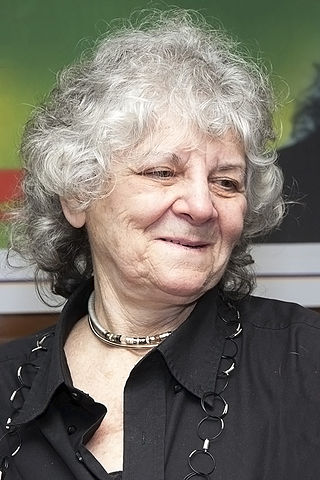
Ada E. Yonath is an Israeli crystallographer and Nobel laureate in Chemistry, best known for her pioneering work on the structure of ribosomes. She is the current director of the Helen and Milton A. Kimmelman Center for Biomolecular Structure and Assembly of the Weizmann Institute of Science.
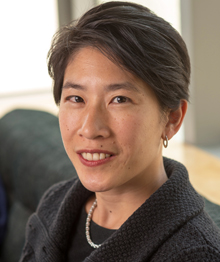
Teri W. Odom is an American chemist and materials scientist. She is the chair of the chemistry department, the Joan Husting Madden and William H. Madden, Jr. Professor of Chemistry, and a professor of materials science and engineering at Northwestern University. She is affiliated with the university's International Institute for Nanotechnology, Chemistry of Life Processes Institute, Northwestern Initiative for Manufacturing Science and Innovation, Interdisciplinary Biological Sciences Graduate Program, and department of applied physics.

Robert Vince is an American scientist known for his contributions to the research in the area of drug design. He is currently the director and professor at the Center for Drug Design at the Academic Health Center for the University of Minnesota.
Catherine T. Hunt is an American chemist. In 2007, she served as the president of the American Chemical Society (ACS). She was a director at Dow Chemical Company.

Michal Hocek is a Czech chemist. He is a group leader at the Institute of Organic Chemistry and Biochemistry of the Czech Academy of Sciences and a professor of organic chemistry at Charles University in Prague. He specializes in the chemistry and chemical biology of nucleosides, nucleotides, and nucleic acids.

Sara E. Skrabalak is a James H. Rudy Professor at Indiana University. Skrabalak leads a research group in the department of chemistry which focuses on the development of new nanomaterials. She has an adjunct appointment in the department of intelligent systems engineering.
Theresa M. Reineke is an American chemist and Distinguished McKnight University Professor at the University of Minnesota. She designs sustainable, environmentally friendly polymer-based delivery systems for targeted therapeutics. She is the associate editor of ACS Macro Letters.

The chemical compound 3-methyluridine, also called N3-methyluridine, is a pyrimidine nucleoside. In living organisms it is present as RNA modification which has been detected in 23S rRNA of archaea, 16S and 23S rRNA of eubacteria, and 18S, 25S, and 28S of eukaryotic ribosomal RNAs.
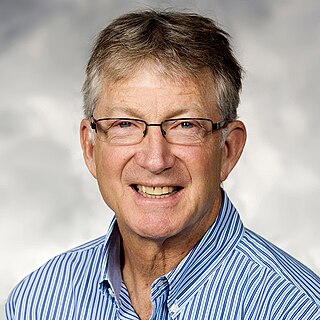
James L. Skinner is an American theoretical chemist. He is the Joseph O. and Elizabeth S. Hirschfelder Professor Emeritus at the University Wisconsin-Madison. He is also a member of the Scientific Advisory Board of the Welch Foundation. Most recently, Skinner was the Crown Family Professor of Molecular Engineering, professor of chemistry, director of the Water Research Initiative and deputy dean for faculty affairs of the Pritzker School of Molecular Engineering at the University of Chicago. Skinner is recognized for his contributions to the fields of theoretical chemistry, nonequilibrium statistical mechanics, linear and nonlinear spectroscopy of liquids, amorphous and crystalline solids, surfaces, proteins, and supercritical fluids. Skinner is the co-author of over 230 peer-reviewed research articles.
Amanda Cordelia Bryant-Friedrich is the dean of the graduate school and a professor in the college of pharmacy and health sciences at Wayne State University. She was awarded the 2014 American Chemical Society Stanley C. Israel Regional Award for Advancing Diversity in the Chemical Sciences and is a Fellow of the American Association for the Advancement of Science and the American Chemical Society. Her research considers modified nucleic acids and biomarkers of disease.
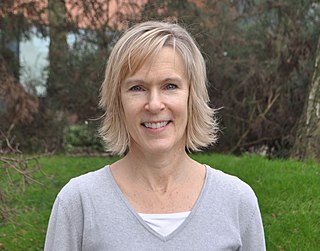
Kristi Lynn Kiick is the Blue and Gold Distinguished Professor of Materials Science and Engineering at the University of Delaware. She studies polymers, biomaterials and hydrogels for drug delivery and regenerative medicine. She is a Fellow of the American Chemical Society, the American Institute for Medical and Biological Engineering, and of the National Academy of Inventors. She served for nearly eight years as the deputy dean of the college of engineering at the University of Delaware.

Katalin "Kati" Karikó is a Hungarian-American biochemist who specializes in ribonucleic acid (RNA)-mediated mechanisms, particularly in vitro-transcribed messenger RNA (mRNA) for protein replacement therapy. Karikó laid the scientific groundwork for mRNA vaccines, overcoming major obstacles and skepticism in the scientific community. Karikó received the Nobel Prize in Physiology or Medicine in 2023 for her work, along with American immunologist Drew Weissman.
Katherine Seley-Radtke is an American medicinal chemist who specializes in the discovery and design of novel nucleoside or nucleotide based enzyme inhibitors that may be used to treat infections or cancer. She has authored over 90 peer-reviewed publications,is an inventor of five issued US patents, and is a professor in the department of chemistry and biochemistry at the University of Maryland, Baltimore County. Her international impact includes scientific collaborations, policy advising and diplomatic appointments in biosecurity efforts.
Xiao Wang is a Thomas D. and Virginia W. Cabot Professor at MIT in the Department of Chemistry. She is the first Core Member of the Broad Institute with an academic appointment in the department of chemistry. Her work focuses on designing and producing new tools and methods for analyzing the brain.
Stephanie Lee Brock is an American chemist who is professor of inorganic chemistry at Wayne State University. Her research considers transition metal pnictides and chalcogenide nanomaterials. She is a Fellow of the American Association for the Advancement of Science and the American Chemical Society.
Kay Michille Brummond is an American synthetic chemist who is Professor of Chemistry and Associate Dean of Faculty at the University of Pittsburgh. Her interests consider cycloaddition reactions that can realise molecules and natural products for organic photovoltaics and targeted covalent inhibitors. She was elected a Fellow of the American Chemical Society (ACS) in 2010, a Fellow of the AAAS in 2021, and awarded the ACS National Award for Encouraging Women into Careers in the Chemical Sciences in 2021.
Susannah L. Scott is a Canadian-American chemist who is Professor of Surface Chemistry and the Duncan and Suzanne Mellichamp Chair in Sustainable Catalysis at the University of California, Santa Barbara. Her research considers the design of heterogeneous catalysts for the efficient conversion of feedstocks and catalysts that improve the environment. She serves as an Executive Editor of ACS Catalysis and is a Fellow of American Association for the Advancement of Science.
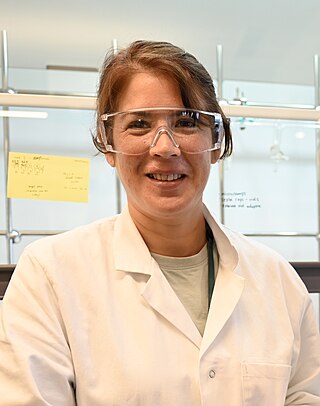
Christine Luscombe is a Japanese-British chemist who is a professor at the Okinawa Institute of Science and Technology. Her research investigates polymer chemistry, organic electronics, organic photovoltaics and the synthesis of novel materials for processable electronics. She serves on the editorial boards of Macromolecules, Advanced Functional Materials, the Annual Review of Materials Research and ACS Applied Materials & Interfaces.
References
- 1 2 Chow, Christine S. (1992). Transition metal complexes as probes for higher-order structure in RNA. caltech.edu (PhD thesis). California Institute of Technology. OCLC 437064763.
- ↑ "Christine Chow". Michigan Science Center. Retrieved 2019-03-17.
- 1 2 3 4 5 6 7 8 9 10 11 "Christine S. Chow". chem.wayne.edu. Retrieved 2019-03-17.
- ↑ "FORWARD to Professorship Speakers". utoledo.edu. Retrieved 2019-03-17.
- ↑ "Current Members - Chow group, Chemistry - College of Liberal Arts and Sciences". clas.wayne.edu. Retrieved 2019-03-17.
- ↑ Chow, Christine. "The Role of Ribosomal RNA Modifications".
{{cite journal}}: Cite journal requires|journal=(help) - 1 2 "Wayne State University scientist named AAAS fellow". Today@Wayne. 2018-05-15. Retrieved 2019-03-17.
- ↑ "Professor Christine S. Chow | RNA Society" . Retrieved 2019-03-17.
- 1 2 "Chow establishes scholarship in memory of former student" (PDF). Wayne State. Retrieved 2019-03-17.
- ↑ "Wayne State University awarded $3 million from NIH to foster science and research careers". EurekAlert!. Retrieved 2019-03-17.
- ↑ Hitchcock, Peter; Mathur, Ambika; Bennett, Jabbar; Cameron, Patricia; Chow, Christine; Clifford, Philip; Duvoisin, Robert; Feig, Andrew; Finneran, Kevin (2017). "The future of graduate and postdoctoral training in the biosciences". eLife. 6: e32715. doi: 10.7554/eLife.32715 . ISSN 2050-084X. PMC 5648525 . PMID 29049023.
- ↑ "Wayne State's NIH-funded BEST Program Achieving Successful Outcomes - MichBio". michbio.org. Retrieved 2019-03-17.
- ↑ "Officers & Committees | ACS Division of Biological Chemistry Website". divbiolchem.org. Retrieved 2019-03-17.
- ↑ "WCC Leadership | ACS Network". communities.acs.org. Retrieved 2019-03-17.
- ↑ "2010 Bioorganic Chemistry Conference GRC". grc.org. Retrieved 2019-03-17.
- ↑ "Dept of Chemistry at Wayne State University Mainpage | Immortality Medicine" . Retrieved 2019-03-17.
- ↑ "ACS Awards and ACS Fellows – PMSE" . Retrieved 2019-03-17.